November 2023
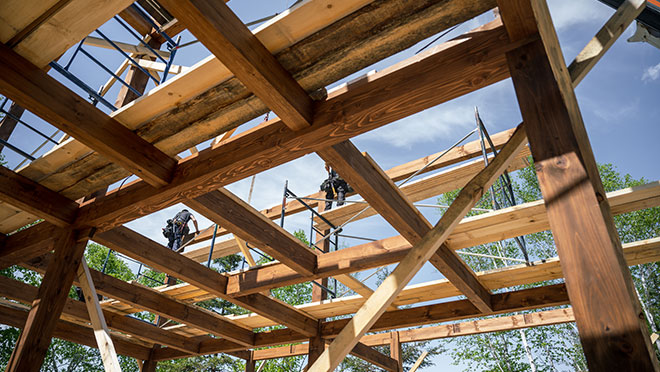
Adoption of the Zero-Carbon Step Code
A growing number of communities are adopting the Zero Carbon Step Code (ZCSC), a new section of the BC Building Code that regulates the greenhouse gas emissions produced by heating equipment in new buildings. Like the BC Energy Step Code, there are several steps, and local governments can start adopting them before the rest of the province.
Many Vancouver Island communities, including Victoria, Saanich, Central Saanich, Nanaimo, and Esquimalt, are moving straight to the top step. This will significantly reduce natural gas heating in new buildings. Vancouver Island has one of the most advanced heat pump markets in B.C., which could make this transition easier for builders. Electric space and hot water heating is already very common, with electricity being the main space and water heating fuel in over 60% of existing homes.
In the Lower Mainland, natural gas heating and hot water in existing buildings is more common, making up 60% of space heating and almost 80% of water heating. The City of Vancouver requires the top step for all new construction. Meanwhile other local governments are providing builders with a choice to either eliminate natural gas heating, or build super-efficient buildings which minimize natural gas consumption. This optional approach has been used in the three North Shore communities, as well as Tsleil-Waututh Nation and the City of Richmond. To date, local governments report that most builders are opting to eliminate natural gas space heating.
Communities in colder parts of the province are also referencing the ZCSC, with the City of Nelson and the Resort Municipality of Whistler taking the lead.
Builders have many questions about what equipment is regulated in the ZCSC. Energy Advisor modelling is showing that natural gas may still be used in cooking and other minor end uses. The regulation still allows fossil fuel use outside the building envelope such as gas barbeques, heated swimming pools and heated driveways. Similarly, back-up heating equipment like wood stoves or decorative gas fireplaces are still permitted.
We're closely tracking local government adoption of ZCSC, as we plan for a future grid that includes electrified buildings, transportation, and industry. Grid design will include demand response, batteries, power management technologies, solar and microgrids to support reliability amidst a warming climate.
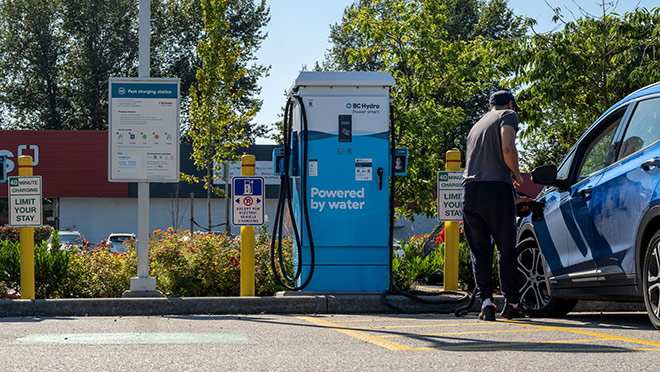
Metro Vancouver's new guide for rolling out EV charging
Metro Vancouver has Canada's highest rate of electric vehicle (EV) adoption and the number of EVs on the road is set to increase exponentially over the next decade. Rapid deployment of EV charging infrastructure is critical to enable this transition to happen.
Local governments and Indigenous Nations are important players in the roll-out of both private and public EV charging networks. They can require EV charging standards in new buildings and facilitate public charging infrastructure deployment.
A recently published guidance document [PDF], commissioned by Metro Vancouver, TransLink and BC Hydro, helps local governments and Indigenous Nations address the following questions:
- What actions can local and regional governments and Indigenous Nations take to make it easy for residents and business to charge EVs?
- What should be our guiding principles and standards for designing and deploying EV charging infrastructure?
- How much infrastructure do we need?
- How do we make our strategies equitable?
- What are the operational considerations?
We're rapidly expanding our public EV charging network across B.C. and will work closely with our partners to accelerate the deployment of our owned and operated fast and level 2 charging in the region.
Reach out to our EV services team or your BC Hydro Key Account Manager to connect with us about partnering to install chargers in your community.
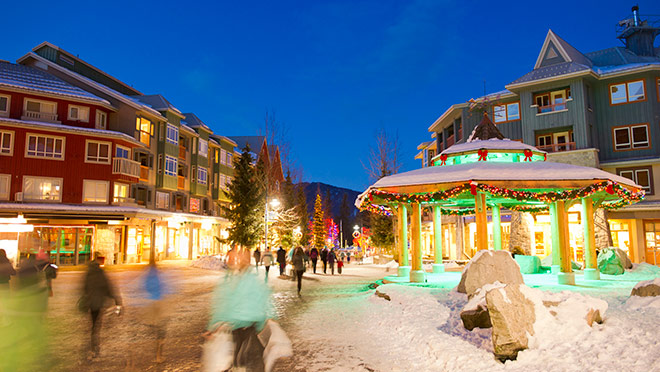
How the hotel sector can reduce carbon emissions
With support from our project implementation funding, the Resort Municipality of Whistler (RMOW) recently held a decarbonization workshop, led by Prism Engineering, with local hotel managers and members of BC Hydro's Key Account Manager team.
The hotel sector is a key part of Whistler's economy, and decarbonizing hotels is crucial to Whistler's commitment to reduce carbon emissions by 50% by 2030. Because visitors prefer eco-friendly accommodation, there's a strong incentive for hotels to adopt low-carbon practices. The workshop outlined specific steps hotel managers can take to assess decarbonization opportunities for their properties, set carbon reduction goals and targets, and adopt specific technologies, such as heat pumps. Participants also discussed what motivated them to reduce carbon emissions at their hotels.
The workshop demonstrated that hotel managers are eager to pursue decarbonization opportunities and are looking for support on what steps to take. Although the costs of retrofits can present a challenge, hotels have strong opportunities to reduce carbon pollution when replacing aging equipment. Overall, the hotel sector can be a strong ally to local governments in pursuing carbon reduction goals.
Maria Thorlakson, RMOW's climate action coordinator, told us that "this workshop provided a unique opportunity to hear what barriers and opportunities hoteliers in Whistler face when pursing low-carbon retrofits. We hope to expand learnings from this workshop to further support Whistler's hotels and other commercial buildings in their low-carbon journey."
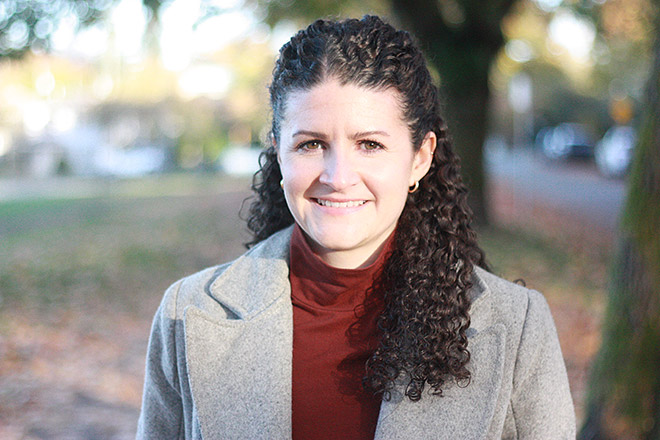
Meet Larisa Lensink, the City of Surrey's community energy manager
The City of Surrey's new community energy manager brings a wealth of experience to the position.
Prior to her new role, Larisa Lensink worked with the City of North Vancouver's environmental sustainability team, advancing a range of initiatives including their electric vehicle strategy, BC Energy Step Code requirements and draft climate and environment strategy. Her previous experience also includes working in solid waste with the Halifax Regional Municipality.
Surrey is a quickly growing and diverse city in terms of resident demographics, land use and building types. For Larisa, this means a variety of strategies and solutions are needed to support community energy goals.
The City of Surrey recently released a new Climate Action Strategy [PDF] that lays out ambitious goals around climate leadership, land use, transportation, buildings, ecosystems, and waste. For Larisa, one of the most encouraging aspects of the document is "the sense of shared ownership of strategy which has meant that many divisions across the organization are invested and already taking on leadership roles to implement actions." Larisa is also excited for the strong electrification mandate the strategy provides, which will enable staff to work towards Zero Carbon Step Code adoption. She's looking forward to Surrey's new climate action platform which will be launching soon and will allow city staff to communicate on their progress.
Larisa has been involved with our Sustainable Communities network for the last several years and told us she has benefited immensely from the group's relationships and knowledge-sharing. In her spare time, Larisa enjoys hiking, travelling, cooking and crafting, especially sewing her own clothes.
Our community energy manager program provides funding for local governments to hire sustainability professionals and advance their clean energy initiatives.
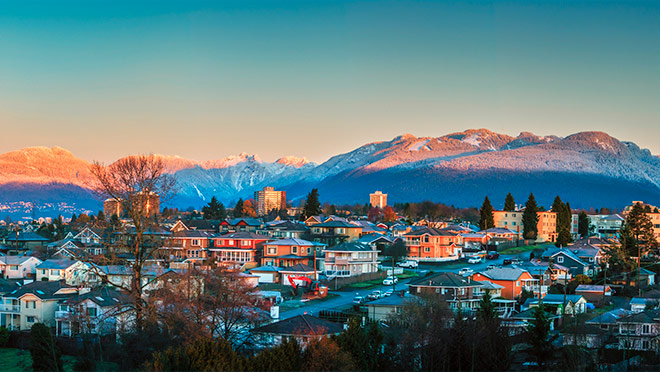
Quick links from around our community
We're sharing some quick, timely links from the energy efficiency and low-carbon electrification field that you might find useful.
- B.C. once again has electric vehicle charger rebates available to help homes and workplaces across B.C. go electric. Learn more.
- Check out the BC Green Building Calendar for upcoming events in B.C. related to high-performance, energy-efficient building design. It's managed by ZEBx with support from BC Hydro through a partnership with Canada Green Building Council and other industry leaders. You can also submit events from your organization.
- Did you know BC Hydro customers can request historical electricity use data for their multi-unit residential, strata property or mixed-used building? This new process provides a helpful resource to obtain load data in support of electrification project planning.